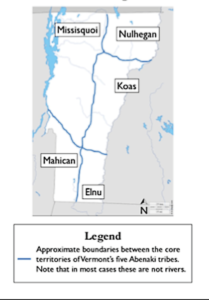VMBA’s vision is:
“To inspire a Vermont filled with individuals reinvigorated by the beauty and challenges found in natural places in a manner that promotes community, ecological awareness and transcends the distractions of our time”
We exist to create and develop vibrant communities that are emboldened by outdoor recreation. We strive to build a connection to natural environments in support of outcomes that benefit the world. While building our connection through outdoor recreation and spending countless hours out on the trails, we want to acknowledge the deep knowledge and rich history that the Native American Tribes in Vermont have worked so hard to preserve and cultivate. As part of our Diversity Initiative for 2021, we plan to further build awareness and appreciation for the land we ride on almost every day. Our work will not be perfect, we recognize that we will make mistakes, but we hope to continue to further build our own education and share that information with our community.
We encourage you to learn more about each of the Tribes that live in Vermont and to acknowledge the land and it’s history that we have the privilege to access. They are here now, living and working to share their culture and heritage. In doing so, they work to educate their youth and surrounding communities on their powerful connection to the land. As good stewards of the land, we should acknowledge their deep history within Vermont and New England.
There are four Native American Tribes recognized by the State of Vermont – the Elnu Abenaki Tribe, Nulhegan Abenaki Tribe, the Koasek Traditional Band of the Koas Abenaki Nation, and the Abenaki Nation at Missisquoi. These Abenaki Tribes are part of the Wabanaki Confederacy, which comprises several nations including Abenaki, Malecite, Micmac, Passamaquoddy, and Penobscot. As part of furthering our own education, below you will find a little bit about each Tribe that live all across Vermont. Below is a map from the University of Vermont and their educational page dedicated to Abenaki Tribes.
The Ko’asek (Co’wasuck) Traditional Band of the Sovereign Abenaki Nation traces the origin of their Tribe back over 180 years, in what is now known today as Vermont. They are active in our communities and work towards educating others in Native culture and traditional heritage. From their website, their mission includes, “we strive to educate our members in our ancient ways and customs while incorporating these tools in our contemporary Native life today.” You can learn more about their mission and history on their website.
The Elnu Abenaki Tribe is based in Southern Vermont. The tribe focuses primarily on passing along their traditions to their children to ensure that their deep history continues on. They share their heritage through educational programs, storytelling, singing & dancing, and crafts. From their website, “we are traditionalists trying to maintain our culture in a modern society.” Find out more about their programs on their website.
The Nulhegan Abenaki Tribe at Nulhegan-Memphremagog’s homeland is in the Northeast Kingdom. “The mission of the Nulhegan Band of the Coosuk Abenaki Nation is to strengthen our government; to build our community, and ensure sustainability; to protect our customs and traditions; and to revive our culture and celebrate our heritage while sharing it with those around us.” As part of their mission to educate communities, The Nulhegan Abenaki Tribe hosts exhibits at the BTV Airport, NH Fire Academy, Ethan Allen Homestead Museum, and Echo in Burlington. Learn more about them on their website.
The Abenaki Nation at Missisquoi has inhabited the Missisquoi River and Lake Champlain Valley for thousands of years. They have maintained a central gathering place for their families and communities. They host several projects including Maquam Bay of Missisquoi, Abenaki Food Pantry, and other cultural events. You can learn more about their history on their website.
As part of our 2021 Diversity Initiative, we strive to further build partnerships with these Native Tribes in Vermont and raise awareness and appreciation for all of their work as stewards of the land. If you are interested in helping assist with this initiative, please contact Krysy, krysy@vmba.org. Thank you.


One thought on “The Land We Ride On”